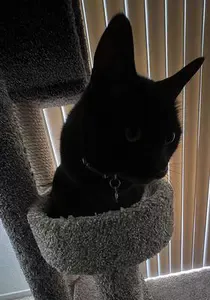Litter Box FAQ: Frequently Asked Questions about the Litter Tray
This litter box FAQ (frequently asked questions) covers some of the more common topics visitors tend to have questions on, or those that I've seen asked frequently on the web.

-
What kind of litter box should I get?
Generally, for a healthy adult cat, the larger the box the better.
A large, uncovered, plastic box with clay litter is typically the best.Some people simply use the rectangular plastic buckets you can buy in a hardware store.
For kittens, though, a much smaller box with lower sides is required for easy in and out.For elderly cats who may be less mobile, a low box may be necessary. Pain from arthritis is one possible cause of litter box problems.
For temporarily or permanently disabled cats, a low box may be required as well. Make it easy on your cat.
Some hidden cat litter box solutions make it easier for your cat to get in and out, but some might make it more difficult. - Where in the house should I place the litter box?
The cat litter box should typically be placed in a low traffic, low noise area of the house, but one that your cat tends to frequent.
It should generally be placed on a hard, stable floor or carpet and your cat should have clear access to it, along with multiple escape routes. No one should be able to sneak up on your cat while she's doing her business. - I've heard that you're supposed to have a certain number of litter boxes per cat. Is this true?
For multi-cat households, follow the one plus one rule. One cat box for every cat in the house, plus one. This ensures that there will always be a free box available for use.
None of my cats have ever exceeded 16 lbs. in weight, and Priscilla has always been under 10 lbs. I have been able to get away with using just two boxes for three cats by cleaning them often (several times a day). For larger cats, or where there is a history of litter box problems, this may not be possible.
For a single cat, you may be fine with just one litter box. If, however, your cat develops a litter box problem, you may need to increase that to two. No matter how many cats or boxes, you need to keep them extremely clean. - I've heard that hooded boxes are bad. Is this true? Yes, they can cause problems with some cats. I have used covered or hooded boxes in the past myself, but I have also kept my boxes extremely clean.
The bottom line here is that your cat's nose is extremely sensitive. The covered box is designed to keep the smells from reaching human noses, which are far less sensitive and normally much further away from the box than your cat's nose.
If your cat turns her highly sensitive nose up at a hooded litter box, then either expect problems with inappropriate elimination, or you'll have to get a different type of box.
As I mentioned, I have used covered boxes before, but after years of hearing from readers about issues that resolved after removing the cover, I've stopped using any kind of hooded or covered box. - There are so many types of litter. What kind of litter should I use?
Most experts will recommend unscented clumping clay litter. Its texture is similar to the grainy, loose, sand-like texture that most cats crave, and it allows them to fully and easily bury their feces. Although, some cats will leave theirs on top just to play king of the box. - I've heard that you can toilet train your cat. Is this a good idea? Why or why not?
Yes, you can train some cats to use the toilet instead of a litter box. I have never tried this, and have no personal experience with it.
Judging by the chatter about it on the Internet I would say it is not as easy as some have claimed. The only proponents of this idea that I've seen are people who've actually been able to successfully toilet train their cats, or people selling products that help teach cats to use the toilet.
The benefits to the cat owner are obvious. The largest purchases that cat owners will make are food and cat litter. For the average cat owner, the amount of money spent on these two items will amount to hundreds of dollars (USD).
Once your cat is trained, there is no litter to buy. There's also no box to clean, so it saves a tremendous amount of time and effort.
Those opposed to the idea say that there are a number of negatives. For one, it is very difficult for even a young healthy cat to balance themselves on the toilet as the surface and structure do not make it easy.
For another, if your cat becomes injured, disabled, or less mobile due to age, jumping up and balancing on the toilet may be impossible. Other considerations include the position of the toilet seat, and the fact that the bathroom door has to remain open at all times. - What about those automatic cat litter boxes. Are they any good?
There are a number of different automatic litter box products on the market. In general, they have improved over time, and there have been some very innovative designs.
There are designs, such as those from Litter Maid, that use regular litter and a raking type cleaning action, all the way to the Cat Genie, which uses permanent granules and actually washes itself.
Some of them have been prone to certain failures, and they all have their drawbacks. Some people have accused others who buy self cleaning or automatic boxes of spoiling their cats, but these devices are actually for the benefit of the cat owner, not the cat.
The convenience of not having to clean the box as much is appealing. Of course, if it results in a cleaner box, then it benefits your cat as well. I'm not sure that it does in all cases. Some people swear by automatic boxes. You'll have to see which ones, if any, fit your needs. - Why is my cat lying in his litter box?
A cat who chooses to lie down or sleep in the litter box is often either ill, or heavily stressed and needs help. While this is not always true, I would recommend you take your cat to the vet. - Why is my cat defecating outside the litter box? Why is my cat urinating outside the box?
The answer to why cats defecate (or urinate) outside the litter box is complex and discussed throughout this section of the site.
Typically, inappropriate elimination is either caused by a medical problem, some form of stress, or something about the condition of the litter box. You'll need to get your veterinarian involved to rule out medical problems.
Defecating outside the box could be due to bowel problems (constipation, diarrhea, impacted anal glands, etc.), or something more serious.
Urinating outside the box may be marking behavior, rather than urination. If your cat actually is urinating, however, this could be due to a urinary tract problem, which range from inflammation to infections to crystals and stones (including blockage), which is a serious medical condition.
Stresses can come in all forms, including unwanted guests, a change in cat litter, the litter box in an undesirable location (e.g., you just set up a work bench near the box, so it's not quiet enough in that spot any longer, the nearby washing machine makes too much noise, the box is hard to get to, etc.), or even another cat outside the house.
One of the most common causes for inappropriate elimination, however, is that the box simply isn't clean enough! See the top reasons why your cat won't use the cat box.
Topics Related to Litter Box FAQ
Litter Box Problems
Cat Lovers Only


Comments: What do you think?
Have your say about what you just read. Leave me a comment in the box below.